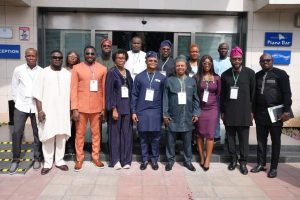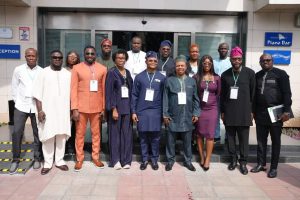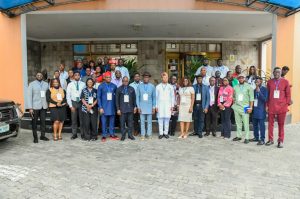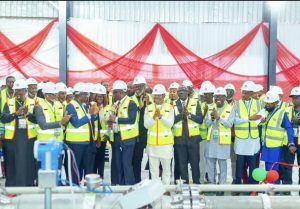Contracts for lifting Nigerian crude oil will begin to yield tangible benefits for the Nigerian economy going by the renewed commitment by the Nigerian Content Development and Monitoring Board (NCDMB), the Nigerian National Petroleum Corporation (NNPC), the Nigerian Maritime Administration and Safety Agency (NIMASA) and other stakeholders in the oil and gas industry.
The Board estimated in 2013 that the Nigerian economy lost over $100bn in five decades by allowing its crude oil to be carried exclusively by foreign owned tankers.
But rising from a recent workshop convened by the Board in Lagos on ‘Crude Oil Off-takers Nigerian Content Deliverables’, the agencies and other stakeholders pledged to grow the quantum of Nigerian Content in the lifting of Nigerian crude oil by working with Nigerian shipping stakeholders to develop in-country assets capacity that meets international standards. They also agreed to ensure that companies that have invested in ownership of crude oil lifting vessels are given first consideration in line with the provisions of the Nigerian Oil Industry Content Development (NOGICD) Act.
NCDMB, NNPC and NIMASA also committed to explore the possibility of a joint fund as part of waiver mechanism which can be used to purchase or finance the building a Nigerian owned Crude Oil Lifting Tankers. Another decision taken at the workshop was to properly define what constitutes “spend” in crude oil lifting contracts for the purpose of complying with the target of 90 per cent industry spend within the Nigerian economy set for Very Large Crude Carriers (VLCCs) by the NOGICD Act.
In his opening remarks at the workshop, the Acting Executive Secretary of the NCDMB, Mr. Patrick Daziba Obah described crude oil lifting and marketing as a major activity in the oil and gas value chain, despite the fact that Very Large Crude Carriers were highly capital intensive to acquire. He however, stressed that Nigeria will remain a major oil producer and not a major oil business value adding nation if the citizens do not own VLCCs.
While identifying opportunities for growing Nigerian Content in crude lifting, Obah noted that VLCCs require manning by certified crew while crude oil lifting attracts opportunities for financial, insurance, inspection and other services. Other spend points in the value chain include the use of lubes and maintenance of VLCCs.
Obah who represented by the Director, Monitoring and Evaluation, Mr. Tunde Adelana explained that the Board introduced Nigerian Content requirements for crude oil lifting in 2013 so as to maximize the value retention opportunities.
According to him, Nigerian Content requirements for crude lifting contracts required that tankers/vessels that are selected to lift Nigerian crude would grow Nigerian Equity Ownership, create sea time attachment for five Nigerian cadets and create employment and training opportunities and utilisation of Nigerian service providers such as financial, insurance, legal and inspection services.
He underscored the collaboration of NNPC in introducing the Nigerian Content requirements for crude lifting, assuring that the Board would intensify its monitoring of companies that secured Crude Oil Term Lifting Contracts to ensure their compliance with the requirements.
Speaking further, Adelana explained that the workshop was convened to harness the views of stakeholders and secure their collaboration towards deepening Nigerian Content implementation in crude oil lifting.
In his presentation, the General Manager, Crude Oil Marketing Division (COMD) of the NNPC, Mr. Adokiye Tombomieye pledged the determination of NNPC to enhance Nigerian participation and maximize Nigerian Content in the lifting of Nigerian crude oil and charged Nigerian firms desirous of participating in the business to comply with the requisite standards with regards to the vessels they put forward in the tenders.
He confirmed that the utilisation of Nigerian service providers by firms selected to lift Nigerian crude had increased from 50 per cent in 2010 to 75 per cent in 2015 and has helped to reduce capital flight, increased in-country spend and created job opportunities for Nigerians.
On the requirement to attach at least five Nigerian cadets per cargo for the purpose of obtaining requisite sea time experience and international certification, Tombomieye noted that Nigerian crude was sold Free on Board (FOB) hence marketers do not own the vessels and are often unable to secure slots for the cadets.
Also speaking at the event, an Assistant Director at NIMASA, Mr. Victor Egejuru confirmed that the agency was collaborating with the Board and NNPC to grow local participation in the marine sector of the oil and gas industry.
While noting that inadequate sea time experience and certification were hindering locally trained seafarers from getting hired by sea going vessels, Egejuru said NIMASA was now addressing the challenges by making it mandatory for vessels operating in Nigerian waters to give a specified number of Nigerians opportunity for sea time experience. He noted that this new requirement was now a condition for obtaining waiver renewals from NIMASA.
The workshop was attended by stakeholders from different segments of the oil and gas and maritime sectors.
Discover more from Nigerian Content Development & Monitoring Board
Subscribe to get the latest posts sent to your email.










